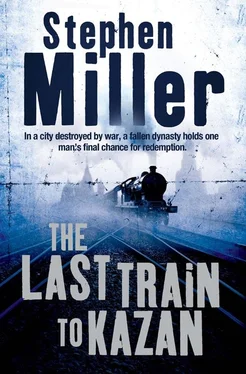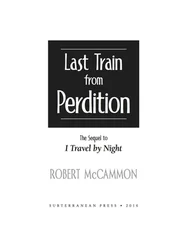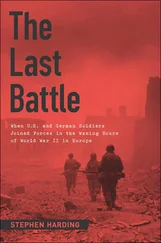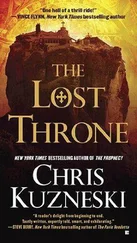‘The city is clearing out, you see? Everyone is scared.’
‘Sure.’
‘There’s only a couple of your boys left.’
‘I’m not staying long either.’
‘For the best, I think.’
They wound their way down the Moscow road, passing the little farms that had been carved out of the birches, slowing to cross the bogs that lined the low parts of the road. Beneath the trees it was wet and the driver pulled the awning over them, so that all they could see were the hocks of the two ponies that were pulling them into the town.
The road widened out as they came down through the populated heights of the city sloping down to the river Iset. Looming over the huts and outbuildings were the first of the larger wooden houses with the usual traditional accoutrements, ornate filigree under the gables and around the doors, painted shutters, saw-cut banisters and sharp picket fences surrounding yards which once had been carefully tended. Then came the first of the really substantial buildings, built with brick and a lot of stone, since the Urals was an ancient mining region.
Precious metals had been quarried out of the mountains for centuries; iron for cannons, gold for money, platinum for jewellery and coal for steam engines. The city had been created by Peter the Great to honour his bride Catherine, and to serve as the gateway to Siberia, a region vast beyond belief, containing too many time zones and nationalities with customs that were utterly foreign to most Russians. In addition to the administrators and bureaucrats based there, Yekaterinburg had become a city of miners, lumberjacks, railwaymen and metalworkers. There were smelting plants, foundries and metals factories ringing the city and spread across the long slope down to the lake. The lake itself had been dammed in the distant past and now it was rimmed with vacated mansions and idle fishing boats.
The city was quiet. Supposedly the revolution had been particularly vigorous in the Urals. An industrial region with a tradition of exploitation had given rise to a hotbed of workers’ agitation, and the mines and factories had been quickly shut down by the expedient of sabotage. The most committed of the workers had already been subsumed into the Red Army and the city was in the process of being inherited by those too poor to run away, those who longed for a Bolshevik defeat, or those who had merely waited too late.
Ahead of them were the first signs of life: two men smoking beside an open door, a woman with a chicken under her arm moving protectively down the sidewalk, two ancient men harnessing a dray.
‘What is that?’
‘Oh,’ said the driver. ‘That’s the Church of the Ascension.’
‘No… that , beside it.’ There was a high barricade made of cut logs like a fort in an American wild west film.
‘Oh, that’s the Special House. It’s where they killed the Tsar,’ he said, turning at Ryzhkov’s sudden reaction.
‘Killed them?’
‘So they say.’
‘When did this happen?’
‘Three days ago in the night. Killed the Tsar and his son. The women have been taken away.’
‘You know this? You saw them go with your own eyes?’
‘They are killing the entire family, so some say.’ The driver shrugged.
‘Do you mean Grand Duke Michael Alexandrovich?’
‘Him, too, the Tsar’s brother. They killed him in Perm last month, everyone said. That came to the telegraph. But then we heard at the hospital that he and his driver got away.’
‘There are too many rumours. I’m trying to find out what really happened.’
The driver arced his head in the direction of the house. ‘The Tsar is dead, I think that is the best guess, but –’ nodding towards Ryzhkov’s breast pocket, ‘– you should be able to find out, eh?’
Ahead of them was the confluence of two monstrously wide streets. The driver drew up outside the American Hotel. It was still draped in red flags, and there was a knot of Red Guards there making a show.
He walked up the stairs off the street, showed his card and went inside. In the wide saloon that opened off the lobby three men were hammering and nailing tables together. Otherwise the building seemed vacant and littered with the obvious markers of defeat. Two clerks were crossing down the corridor with boxes of files, en route to the furnace in the ballroom. A third clerk knelt beside the furnace blowing and cursing at a smouldering mound of paper. He stopped one of the young men with his magic red book and asked for direction to the Cheka office.
‘You’re too late, sir. The building is being abandoned. I’m burning the last of the pay records right now, and then I’m on my way.’
‘But Cheka headquarters is here in the hotel?’
‘Oh yes, right down that hallway. Room number 3, sir.’
He walked down to the room. The door was open. Number 3 was a large rectangle, a small cloakroom at one end. A sofa. A pair of desks. Several broken lamps. Fragments of paper and carbon flimsies spread across the floor. Another boy walked past him with a broom and began sweeping them up into a pile. An inkwell had turned over and black footprints had been tracked into the Turkish carpet.
‘Where have they gone, do you know?’
The clerk shrugged and did not meet his eye. ‘Back to Moscow, comrade…’
Ryzhkov crossed the office to one of the desks, looked in its drawers and found a Yekaterinburg city directory there. It listed all addresses, and those with telephones were printed in bold. There was only one Eikhe in the book – No. 2 Kushok Lane.
‘Do you know where Kushok Lane is?’ he asked the clerk.
‘Right on the other side of the city, in the direction of the Trouchenko foundry.’
‘Too far to walk?’
‘Oh, yes.’ Ryzhkov watched him crabbing the papers into a ball, stuffing them into a mail sack.
‘Where is the local soviet?’
‘Besides right here, you mean?’
‘I need to talk to someone with responsibility.’
The clerk made a doubtful face. ‘Either at the municipal hall or at the civic theatre, I’d guess.’
Ryzhkov walked out of the American Hotel, past the young guards who were not quite sure what they were guarding, down to the street. The ground sloped slightly towards the area around the dam, and he kept going until he came to the municipal hall, an old building that looked suddenly out of date and in the process of being abandoned, its doors thrown open and two anxious Red Guards still lingering outside. A motor car and a truck were idling there, ready for a final run to the station.
He asked directions, and across the park he caught the Number 14 tram which was still running, and which carried him some dozen blocks past the sprawling and dead quiet Selki factory and let him off at the last stop.
From there Kushok Lane was only two blocks, and he stepped out into the muddy street and began walking. On one side of the street was a row of workers’ houses that had been arranged diagonally to the street, climbing the low ridge with a fine view of the city beneath. There were children playing in the worn expanses in front of the houses, running around the fruit trees that had been girdled with octagonal planters for protection.
No. 2 was a semi-collapsed ancient wooden house, the logs darkened to blackness with soot, weeds grown up and died in a tangle around the foundations. A wide canvas tarpaulin that had been rigged up to shade half of the house, where a woman was butchering what Ryzhkov recognized to be a goat.
‘I am looking for Nikolas Eikhe,’ he said to her.
She turned and gave him a long look, taking in the suit – now truly shabby – the thick shoes, the rucksack with the leather raincoat rolled into it. ‘He’s not here.’
‘Ahh…’
‘What’s it about?’
Читать дальше












